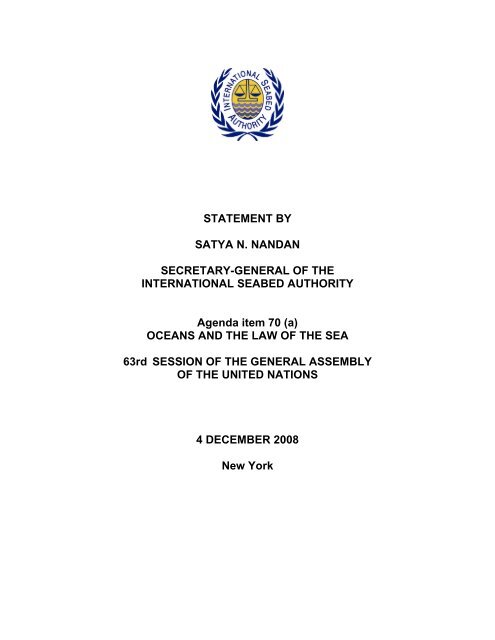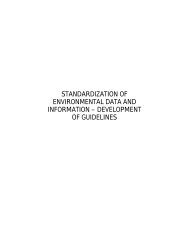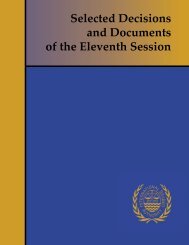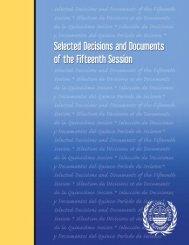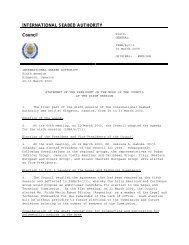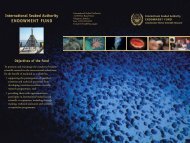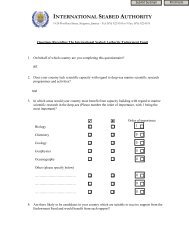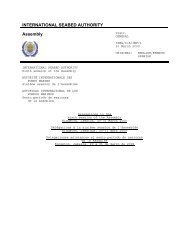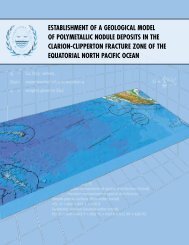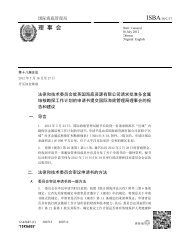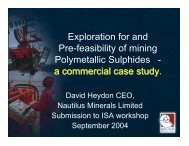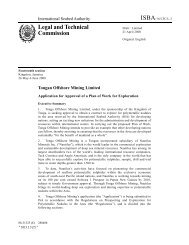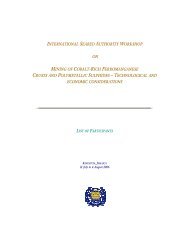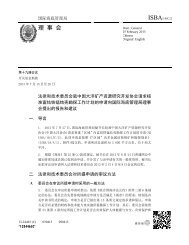Statement - International Seabed Authority
Statement - International Seabed Authority
Statement - International Seabed Authority
You also want an ePaper? Increase the reach of your titles
YUMPU automatically turns print PDFs into web optimized ePapers that Google loves.
STATEMENT BY<br />
SATYA N. NANDAN<br />
SECRETARY-GENERAL OF THE<br />
INTERNATIONAL SEABED AUTHORITY<br />
Agenda item 70 (a)<br />
OCEANS AND THE LAW OF THE SEA<br />
63rd SESSION OF THE GENERAL ASSEMBLY<br />
OF THE UNITED NATIONS<br />
4 DECEMBER 2008<br />
New York
Mr. President,<br />
I would like to take this opportunity to highlight some of the most important<br />
developments in the work of the <strong>Authority</strong> over the past twelve months.<br />
First, however, I wish to make brief reference to operative paragraph 33 of draft<br />
resolution A/63/L.42, which takes note of the progress made by the <strong>Authority</strong> in its<br />
deliberations and encourages the finalization of regulations for prospecting and<br />
exploration for polymetallic sulphides as soon as possible. I would like to inform the<br />
Assembly that, at its 2008 session, the Council of the <strong>Authority</strong> continued to make good<br />
progress in its work of elaborating these regulations. As a result of intensive work, it<br />
was possible to resolve many of the outstanding issues with respect to the draft<br />
regulations, particularly the environmental issues that had been of concern to many<br />
delegations in previous sessions. In particular, the addition of a comprehensive review<br />
clause gave a much-needed assurance to many members of the Council that it would<br />
be possible to revisit critical parts of the proposed regulatory regime in the future in the<br />
light of experience and improved economic and scientific knowledge. It is important to<br />
continue this work at the next session and I believe that most members of the Council<br />
are committed to bringing this work to a conclusion in 2009. I believe that this is an<br />
important goal. Recent exciting scientific discoveries mean that it is quite likely that one<br />
or more States will wish to pursue exploration licences in the near future. It is essential<br />
in these circumstances that the regulatory framework is not delayed unnecessarily.<br />
Mr. President,<br />
The growing interest in seabed mineral resources was demonstrated by the fact<br />
that earlier this year, the <strong>Authority</strong> received two new applications for licences to explore<br />
for polymetallic nodules in the international seabed area. These applications are<br />
presently still under consideration by the <strong>Authority</strong>’s Legal and Technical Commission<br />
and will be considered further during the fifteenth session in 2009. Nevertheless, the<br />
applications are highly significant for two reasons. First, they cover areas of the prime<br />
nodule province in the Central Pacific Ocean that are reserved for the conduct of<br />
activities by the <strong>Authority</strong> or by developing States. Second, they are the first<br />
applications to have been made to the <strong>Authority</strong> by a private sector applicant sponsored<br />
by developing States, in this case the Governments of Nauru and Tonga. This is in<br />
contrast to the situation with regard to the existing contractors with the <strong>Authority</strong>, all of<br />
which are government-sponsored enterprises and which had commenced their<br />
exploration activities during, or in some cases even before, the pioneer regime<br />
contained in resolution II of UNCLOS III was adopted. This is a very interesting<br />
development for the <strong>Authority</strong> and for the international community as a whole. For one,<br />
it will provide a valuable test of the effectiveness and integrity of the international<br />
machinery that has been developed through the 1994 Agreement and the rules,<br />
regulations and procedures of the <strong>Authority</strong>. For another, private sector involvement in<br />
the development of marine mineral resources in the international seabed area may well<br />
act as a catalyst to other contractors with the <strong>Authority</strong>, most of whom have been<br />
content to carry out their activities at a very slow and deliberate pace.<br />
1
Another major development in the work of the <strong>Authority</strong> during 2008 was a<br />
proposal to set aside certain areas of the Central Pacific Ocean for the purposes of<br />
environmental protection and to safeguard biodiversity. This proposal, which is<br />
presently under consideration by the Legal and Technical Commission is based on<br />
extensive scientific and geospatial analysis of the environmental characteristics of the<br />
areas concerned over a period of several years. The potential need to set aside areas<br />
to preserve their unique flora and fauna was recognized by the drafters of the<br />
Convention itself. Under article 162(2)(x) of the Convention, the Council of the <strong>Authority</strong><br />
has the power to disapprove areas for exploitation where substantial evidence indicates<br />
the risk of serious harm to the marine environment. Similarly, under the regulations<br />
governing exploration for polymetallic nodules, contractors are required to designate socalled<br />
preservation reference zones where no mining shall occur in order to ensure<br />
representative and stable biota of the seabed. I very much hope that the Legal and<br />
Technical Commission will be in a position to make a specific and fully-reasoned<br />
proposal to the Council in 2009 on this matter.<br />
Mr. President,<br />
I am pleased to inform the Assembly that I have just returned from Rio de<br />
Janeiro, Brazil, where last week the Government of Brazil graciously hosted a seminar<br />
on the marine mineral resources of the South and Equatorial Atlantic Ocean. This was<br />
the second such regional seminar convened by the <strong>Authority</strong>; the first having taken<br />
place in Indonesia in 2007. Like the previous event, the seminar in Brazil was a great<br />
success, bringing together international scientific and technical experts as well as a<br />
broad cross-section of technical personnel from Brazil and representatives of a number<br />
of African States with an interest in the Equatorial Atlantic Ocean. I would like to convey<br />
my appreciation to the Government of Brazil for its initiative in deciding to host the<br />
seminar and for its excellent hospitality. The proceedings of the seminar will be made<br />
available to all in due course. The third regional seminar is due to be held in Abuja,<br />
Nigeria, in the first part of 2009.<br />
Mr. President,<br />
I note with appreciation paragraph 35 of draft resolution A/63/L.42 which calls<br />
upon members of the <strong>Authority</strong> to pay their assessed contributions in full and on time.<br />
Although, regrettably, some members have allowed arrears to build up, I believe that in<br />
most cases this is due to inadvertence. In general, it is gratifying to observe that, during<br />
the past twelve years, members of the <strong>Authority</strong> have shown a commendable readiness<br />
to pay their assessed contributions promptly. I thank you all for your support in this<br />
respect.<br />
With respect to operative paragraph 36 of the draft resolution, I am very pleased<br />
to announce that, in light of the positive experience we had in 2008 as a result of<br />
bringing forward the dates for the annual session, the fifteenth session of the <strong>Authority</strong><br />
in 2009 will be held from in Kingston from 25 May to 5 June. It will be preceded by a<br />
2
one-week meeting of the Legal and Technical Commission. I would remind member<br />
States, nevertheless, that there is no room for complacency and I urge them to ensure<br />
that they are represented at the meetings of the <strong>Authority</strong> in Kingston, especially as<br />
there are a number of important decisions to be taken at the next session.<br />
Mr. President,<br />
Last year, I had informed this Assembly of the establishment by the <strong>Authority</strong> of<br />
its Endowment Fund for the promotion of marine scientific research. Since last year,<br />
the necessary administrative and practical arrangements have been put in place to<br />
enable the Fund to begin its operations. In addition, the Secretariat has worked<br />
throughout the year to establish partnerships with a number of leading scientific and<br />
technical institutions around the world which are interested in collaborating with the<br />
<strong>Authority</strong> to provide training opportunities for personnel from developing countries.<br />
The practical arrangements that have been made include the appointment of a<br />
panel of experts to advise the Secretary-General on applications for assistance from the<br />
Fund. This panel met recently for the first time and it gives me great pleasure to report<br />
that, as a result, the <strong>Authority</strong> will shortly be announcing the opening of applications for<br />
the first opportunities, in the form of fellowships, to be supported by the Fund. I wish to<br />
encourage qualified scientists from developing countries to apply for these opportunities<br />
in due course.<br />
I also wish to once again encourage member States and others to contribute to<br />
the Fund. In this regard, I wish to acknowledge with gratitude the Governments of<br />
Mexico and the United Kingdom for making contributions to the Fund in 2008.<br />
Mr. President,<br />
As many of you will be aware, this is the last occasion upon which I shall address<br />
the Assembly in my capacity as Secretary-General of the <strong>Authority</strong>. My term of office<br />
comes to an end on 31 December. I would like to take this opportunity to congratulate<br />
my successor, Mr. Nii Allotey Odunton, of Ghana, on his election as the next Secretary-<br />
General of the <strong>Authority</strong> and to wish him well. I also wish to express my sincere<br />
appreciation to member States for the support they have given to me during my term of<br />
office and to thank you all for placing your trust in me. It has been a privilege to serve<br />
the international community and to contribute towards the establishment of the <strong>Authority</strong><br />
as one of the key institutions created by the Convention.<br />
Over the past 35 years, since the beginning of the Third UN Conference, I have<br />
had the extraordinary privilege to have been associated with most of the developments<br />
in the law of the sea. A number of milestones stand out. In the early days, the long and<br />
painstaking process of weaving together the complex and multifaceted provisions of the<br />
Convention into a coherent whole in order to achieve a broad agreement. Then the<br />
adoption of the Convention in 1982. After 1982, I also witnessed the work of the<br />
Preparatory Commission in my capacity as the Under Secretary-General for Ocean<br />
3
Affairs and the Law of the Sea and the Special Representative of the Secretary-General<br />
for the Law of the Sea. Another milestone took place in 1994 when the outstanding<br />
issues with respect to Part XI of the Convention were finally resolved through the 1994<br />
Agreement. This opened the door for universal participation in the Convention, which in<br />
turn has led to the current situation where there are 157 Parties to the Convention.<br />
There were other challenges to the Convention in the 1990s, particularly the<br />
question of how to solve the problem of severe depletion of global fish stocks. This led<br />
to the adoption of the second implementing agreement in 1995 – the Fish Stocks<br />
Agreement – which again I was fortunate to have been closely involved in as the<br />
Chairman of the Conference. Following the entry into force of the Convention in 1994 it<br />
was necessary to establish the various institutions created by the Convention, including<br />
the Tribunal, the <strong>Authority</strong> and the Commission for the Limits of the Continental Shelf. It<br />
has been my great privilege to have been entrusted with the establishment of the<br />
<strong>Authority</strong> and get it to the point of being fully operational.<br />
What is most remarkable is that at each stage the Convention has been further<br />
strengthened. It continues to be applied with a remarkable degree of uniformity and<br />
consistency that we had never envisaged or foreseen during the Conference. Any<br />
issues that have arisen we have been able to resolve through the technique of<br />
implementing agreements within the framework of the Convention. In this regard, one<br />
characteristic of the Convention is its flexibility. While it contains important principles it<br />
also contains internal flexibility which allows for further development of those principles.<br />
This gives me confidence that as new issues arise they can be resolved within the<br />
framework provided by the Convention without upsetting the fundamental balance that<br />
has led to its broad acceptance and application in State practice. It is important<br />
nevertheless for those who believe in order in the oceans to be vigilant and guard<br />
against the temptation to assert rights beyond what is provided for in the Convention. It<br />
is in the interests of everyone to preserve the basic principles of good order and<br />
peaceful use of the oceans. I have every confidence that this Convention, compared to<br />
its predecessors, the 1958 Conventions, will endure.<br />
*****<br />
4


